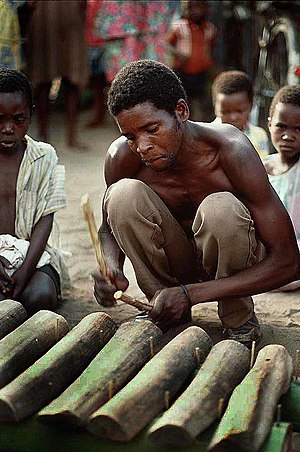 |
| Malawian male playing the instrument 'mangolongondo'". (Photo credit: Wikipedia) |
MIGRATION & MALAWIAN IDENTITIES
The area presently known as Malawi has always been an area consisting of diverse peoples with diverse ethnic groups, religions, and customs. Therefore the concept of a Nyasa or Malawian identity has always been fluid and in constant transformation. Many of the ethnic groups in present day Malawi came to the area as a result of historical movements like the Mfecane, Bantu Migrations, and the slave-trade (groups moved in the area to escape enslavement). Many of the ethnic groups such as the Nogni, settled in the area, making Nyasaland a nation of immigrants. The ethnic groups in Malawi have also traditionally inter-mingled and adopted the cultural practice, language, rituals of groups that they lived in close proximity with. Malawi has therefore always been a melange of ethnic groups that identify with their respective ethnicity but also with the political unit of Nyasaland. During the pre-colonial era, Nyasaland consisted of a wide range of social-ethnic groups that began to identify themselves as 'Nyasas'.
Malawi has always been a nation of migrants. During the colonial era, Nyasaland was used as a source of
labor. This led to the mass migration of Nyasas to work in neighboring countries such as
Zambia and Zimbabwe or South Africa in search of employment. This was significant because the concept of being a 'Nyasa' grew from this. Outside of Nyasland, Malawians were collectively identified as 'Nyasas' and not by their ethnic group. Therefore the idea of identifying with the Nyasaland was very strong amongst Nyasas. This sense of Nyasa identity paved the way for Nyasaland's persistent fight against the Federation of Rhodesia and Nyasaland. When Malawi became independent, the Nyasa identity transformed in to a strong Malawian identity. It was in this environment that the Dual Citizenship laws were written in order to promote national unity and continue the process of nation building. The law makers wanted to ensure loyalty to Malawi as a new independent state.
New Migration Patterns
 |
| English: Map of the Federation of Rhodesia and Nyasaland. Own work. (Photo credit: Wikipedia) |
THE MALAWIAN DIASPORA:
Impact of the Malawian Diaspora:
Where ever there are large settlements of Malawians, Malawians have been influential players. There are over 3 million Malawians in neighboring Zimbabwe. Malawians have been actively involved in trade unions and the political process. Their President, Robert Mugabe is also said to be of Malawian decent. Two Zambian Presidents are also of Malawian descent. In South Africa, Malawians were instrumental in the anti-apartheid movement in terms of grassroots organization. In the United States of America, Malawians rank as one of the top countries from Africa with regard to educational achievement. This situation has therefore had a
debilitating impact of Malawian public and private sector institutions in terms
of retaining a skilled labor force. The
impact of the brain drain has heavily impacted the healthcare sector in Malawi, resulting
in a situation where at one stage, there were more Malawian trained doctors
practicing in Manchester then in Malawi. The brain drain has led to a situation where
Malawi relies on expatriates for certain skill sets. This has its disadvantages
because some of the expatriate experts lack the knowledge of the local factors
which are vital for the success of a project. In order to promote a brain gain in this globalized world, Dual Citizenship laws are necessary for the development of Malawi so that it can attract this demographic.
Countries in the Global North are actively recruiting Malawians and
offering them incentives to become citizens in their own countries in order to get a competitive edge. Malawi likewise should aim
to retain its diaspora by offering Malawian incentives to retain ties
with Malawi such as retention or acquisition of citizenship. Many Malawians end up taking citizenship in order to remain competitive in the work force. In order to qualify for certain jobs (especially those requiring security clearance), it becomes necessary for Malawians to obtain foreign citizenship. Similar trends can be seen for Malawians living in the EU where EU citizenship becomes necessary for certain jobs. Not being able to work affects the amount of remittances that can be sent to Malawi.
Malawians in the Diaspora primarily contribute to the development of Malawi through remittances. Remittances are money that is sent back to Malawi to ensure household security and poverty alleviation. This money is typically
used to help siblings, relatives, and friends start or expand businesses. It is also used to buy property, build
houses and for a variety of investment projects. Like in other African countries, the
Malawian Diaspora has been involved in maintaining and extending public
infrastructure like schools, hospitals, health centers and donating clinical
equipment. The monies are an integral part of development projects. Remittances from the Malawian Diaspora also serve as an important source of foreign exchange for Malawi (in many countries remittances exceed foreign aid amounts). Malawians in the Diaspora serve as the most important cultural ambassadors for the nation. A nation's Diaspora is a network of willing individuals that are ready to assist the country in their common development goals. Therefore there is an opportunity for Malawi to engage its Diaspora in various ways. A legal commitment from the state would help foster positive relations between the Malawi Government and the Malawian diaspora.

please assist children of migrants who are scattered alover to be able to go back to malawi when willing to do so without difficult.
ReplyDeleteThis was extremely helpful for what i am studying in Geography, the factual information was very good and a great source for the answers i needed about Malawian population migration..... thank you whoever wrote this :)
ReplyDelete